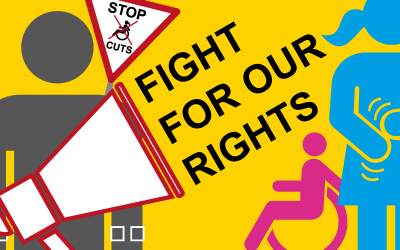“Shrouded round in dread
We are not cocooned
We are suspended.”
For LGBT+ History Month 2021, Regard Co Chair Dr Ju Gosling FRSA invites you to her home studio to listen to some poems and find out more about Disabled LGBTQI+ people; the history of Regard, the national LGBTQI+ Disabled People’s Organisation; and the impact of Covid-19 on our elders and other vulnerable members of our community today.
What follows is a transcript of the video presentation:
My name is Ju Gosling. I’m a white woman with pale olive skin, a self-styled hennaed ‘Corona crop’, and green eyes behind black plastic glasses. I have black wrist-braces, silver-coloured jewellery and a rainbow brooch and watch strap, and I’m wearing a dark purple silk shirt and black leather blazer. Behind me are rainbow flags, and I am sitting in a silver-coloured manual wheelchair with bright orange rim covers and a lime green fake-fur cover.
For the last 20 years I have been a Co-Chair of Regard, the national LGBTQI+ Disabled People’s Organisation. I mean by this that we identify as part of the international movement of organisations led by Disabled people ourselves. Founded in 1989, Regard has four aims: to highlight disability issues within the LGBTQI+ communities; to highlight LGBTQI+ issues within the Disabled communities; to combat social isolation among LGBTQI+ Disabled people; and to campaign and work strategically on issues that particularly impact on LGBTQI+ Disabled people. Regard has no core funding and no staff. Instead, the organization is run by the members for the members, who are mostly LGBTQI+ Disabled people ourselves, although we also offer Associate Membership for organisations and allies.
In order to be as effective as possible, we have a large Executive Committee, and each person takes responsibility for one or more areas of work, regularly reporting back via email to the group. So for example, we have members representing and working for the interests of people with learning difficulties, people with HIV and Deaf people; members liaising with the disability and LGBTQI+ communities; members focusing on issues like social care and hate crime; and so on. We always need new Executive Committee, members so please do bear this in mind. We also have a Facebook page, a website, and a daily email group for our membership, where we circulate all of the information we receive about other activities, news and campaigns from the Disabled people’s and LGBTQI+ communities. However, many Disabled people are digitally excluded, while others have no privacy and cannot be out because it is unsafe, limiting our reach.
As many as one in three of the UK’s LGBTQI+ population are Disabled, compared to one in four or five of the overall population. This is due to the long-term impact on our mental and physical health of discrimination, together with a higher incidence of HIV among gay and bisexual men. It is still common for someone to be rejected by our family or to have only superficial relationships with them; to be rejected by our childhood friends and to leave the area where we grew up; to have to hide our identity all of the time we are at work; to experience additional difficulties in meeting partners and setting up home together; and so on. This is extremely damaging to our mental health, and also leads to behaviours such as addiction that cause long-term damage to our physical health. Then there are people who never recover from physical attacks linked to discrimination, including head and spinal injuries.
Stonewall has found that LGBTQI+ Disabled people experience much higher rates of hate crime than other LGBTQI+ and Disabled people, and generally are the most disadvantaged of all Disabled and LGBTQI+ people. Many LGBQTI+ venues are inaccessible due to environmental, social or attitudinal barriers, and this means that LGBTQI+ Disabled people are often very isolated indeed. This in turn impacts on our mental health and makes us vulnerable to hate crime, including ‘mate crime’, where people posing as befrienders take over an individual’s home and resources.Regard works to highlight the fact that LGBTQI+ hate crime victims are overwhelmingly disabled, and pushes for policy makers and service providers to recognize this. We lobby organisers of Prides and other LGBTQI+ events to implement our own guidelines to inclusion and accessibility, which you can find on the website as Pride Access Guide We raise awareness of repeated failures to include Disabled people with event funders.
From now on I’m going to include some poems which have been written in the past 12 months about the experiences of LGBTQI+ social care users and other Disabled people during Covid-19. So for anyone who is feeling particularly vulnerable, I am going to issue a trigger warning and suggest that you take a break from your live event and then come back for the last ten minutes, which will be a question-and-answer session. If you wish, you can always choose to view the rest of this video another time on the Regard website.
I am going to begin with a poem called CareLess, which I wrote last June, Pride Month. The story of our Disabled community is the story of the wider LGBTI+ community too — the majority of people become Disabled in adult life, and two-thirds of Disabled people are over retirement age. CareLess tells the fictional stories of social care users in the first four months of the pandemic, based on all-too-common real-life experiences; the shared factors in our history that make us particularly vulnerable to Covid-19 now.
Without being able to draw on significant support from family members, childhood friends, partners and children, LGBTQI+ Disabled people have no option but to access state services, and are heavily over-represented among social care users. This includes care home residents — a national shortage of accessible and supported housing means that LGBTQI+ people of all ages are living in care homes. When LGBTQI+ people do use social care, research carried out by Regard with the University of Bristol, Stonewall and the Social Care Institute of Excellence shows that we experience widespread discrimination, again partly because lack of community and family support makes us more vulnerable.
Regard works closely with the Care Quality Commission, which regulates social care, the National Institute for Clinical Excellence and Social Care, which sets standards, and the Social Care Institute for Excellence, which creates practice guidelines for social care workers and policy makers. We also succeeded, in the noughties, in implementing monitoring of care home residents’ sexual and gender orientiation, although this rule is often ignored. Far from being encouraged to be out, before the Equality Act 2010, members living in care homes reported that they were told they would be evicted if they came out to staff or other residents. More recently, out members have been asked to leave their care homes on the grounds that their peer support needs cannot be met and their safety from other residents not guaranteed.
CareLess
Pete isn’t a Dad, though he’s somebody’s son
Ellen is lovely, but nobody’s Mum
They both left home early and haven’t been back
The same’s true of Trudy, and Melvin, and Jack.
Sue’s not seen her kids since she came out as trans
Bill’s son avoids him whenever he can
Trevor’s lost touch with his sisters and brothers
And Cath’s son has simply no time for his mother.
Pete wasn’t able to come out at work
So his friendships were limited, much as that hurt
He found love and lost love and found it again
And lost it once more, which has caused him great pain.
Trudy’s another who stayed in the closet
Her life and her livelihood both rested on it
Her happiest moments were clubbing at night
But she daren’t risk it often despite the delights.
Ellen found her true love early in life
But wasn’t entitled to call her a wife
And cancer came long before change in the law
So she’s labelled a spinster, which makes her feel sore.
Melvin has had a substantial career
Successful and wealthy despite being queer
But developed MS when aged just 43
So his money was taken to pay his care fees.
Jack spent his working life wielding a broom
Sleeping and eating in one tiny room
Kicked out by his parents, he took no exams
And his minimal wages were paid cash in hand.
Sue knew she was different when she was a girl
Misgendered, disguised and with massacred curls
When three decades later she found her true self
A judge took her children, then life took her health.
Bill’s lifelong partner is great and called Dan
But Bill has dementia and once it began
Since they couldn’t afford to become partners in law
Bill’s son got control, and then showed Dan the door.
Trevor trained as a teacher and worked in a school
‘til arrested and outed and sacked under rule
His crime being only to love until death
A dear man whose sudden loss left him bereft.
Cath led a happy and sociable life
Not wanting to settle for only one wife
But her son’s signed her over to state social care
Only ‘family members’ can visit her there.
It was March 2020 and all through the land
Infection was spreading with each shaken hand
With each missing mask and each failure to act
With each mass event, each denial of fact.
Then across England the coughing began
Throats filled with glass and eyes filled with sand
People struggled for breath as their fevers soared high
And the promised protection was founded on lies.
Pete died the first week and stayed where he lay
‘til the carer who gave it him came the next day
Ellen died next after going to shop
She’d had no choice as her social care stopped.
Then Trudy and Melvin and Cath became ill
And soon so did Jack, and Sue, Trevor and Bill
As infection raged through one in three of care homes
With visitors banned, they all suffered alone.
At the time of their passing their deaths didn’t count
It took far too long for the pressure to mount
And while they were dying no ambulance came
Since a doctor had put DNR by their names.
No one wrote tributes to Mum or to Dad
No grandchild complained that their treatment was bad
Voices were silent or spoke the belief
That for old and sick people it was a relief.
No services marked their departure from life
No films were made for a husband or wife
No graves exist, and their ashes lie spread
Where no one can possibly notice they’re dead.
Now it’s Pride Month and still people are dying
Quietly lovers and friends are still crying
Rainbows on windows served only to hide
The rainbow that faded and vanished inside.
Sadly, as we are all aware, nothing has changed in History Month 2021. Care home residents are still dying in large numbers, and LGBTQI+ care home residents continue to be among those with the least support from relatives and the heaviest dependence on state funding, meaning they are living in the poorest standard facilities. Now, with Covid-19, younger residents who are themselves in good health and usually lead an active life in the community — and many working-age Disabled people spend years in residential care due to housing shortages — they’ve also been trapped in their care homes for nearly a year now.
What is not more commonly known is that social care users in the community have the same high mortality rate as people living in residential care. Despite this, we have been denied the same priority for testing and vaccinations. In both cases, no records are being kept about the victims’ sexual and gender orientations, but the unique circumstances of our community means that LGBTQI+ social care users are likely to be over-represented among those who are dying in the community too. My partner and I have been shielding at my home since mid-March last year. We have had no visitors, no voluntary help, no family support — and no support from our own community.
Without this support, we haven’t been able to negotiate the local authority system successfully and obtain the PPE that we need for our social care workers to come in. This means we have been locked down with our assistance dogs in Newham, one of the worst affected local areas in the world, reliant on deliveries and without access to our usual medical treatments. If we become ill, there is no emergency plan. However, to date we have managed, so we’re the lucky ones. Many more LGBTQI+ social care users won’t have coped without the support structures that are available to straight people.
I wrote the next poem, Metamorphosis Paused, last Spring, when shielding was still being described as ‘cocooning’.
Metamorphosis Paused
A cocoon is a miraculous creation
Containing everything needed to survive
A grub is reborn in blissful unconsciousness
Emerging with unimagined abilities
Soaring on wings to a richer new life ahead.
Caterpillars do not lose their rights when they enter into their cocoons
Caterpillars do not need to prove larvae status in order to eat
Caterpillars do not have to worry about how to wash their hand splints
Caterpillars do not struggle when they try to make a telephone call
Caterpillars are not abandoned without masks and gloves for their carers.
Cocoons are insulated against dealing with officialdom
Cocoons do not rock with emotion nor shake with fatigue
Cocoons do not crack with every essential delivery
Cocoons do not splinter with every essential visitor
Cocoons promise futures, not lives perhaps permanently on hold.
Cocooned is not waiting anxiously for neighbours to go in so you can clear up after your assistance dog in safety
Cocooned is not being enraged by reckless politicians and the selfishness of people sauntering past your front door
Cocooned is not always missing the people you care about
Cocooned is not being in fear for the lives of those you love
Cocooned is not having rows with the loved ones who are present
Cocooned is not sweating with panic each time the door bell rings
Cocooned is not being breathless with pain as you cope alone
Cocooned is not being ever-watchful for approaching death.
Shrouded round in dread
We are not cocooned
We are suspended.
In February 2021, the situation facing LGBTQI+ Disabled people — and that could be any one of us tomorrow — is extremely serious. The vast majority of day services that many social care users previously relied on have not operated since last March, and as with ourselves, many people have also had to choose between receiving unsafe care at home and no care at all. This has also impacted on social care users’ access to food, since many people were used to receiving their main meal of the day as part of a day service. Covid-19 is the biggest health challenge facing our community since HIV.
Despite this, there has been no action from Stonewall, who refused to object when the Coronavirus Emergency Bill significantly cut social care users’ right to care — in fact, Stonewall’s acting Chief Executive was on furlough while the Bill went through Parliament, and staff at work told us that the only issue they saw with the Bill related to civil liberties. Nor have we seen any moves by Stonewall to support vulnerable members of our community to get safe access to food, let alone more holistic help. Regard has tried hard, but alone we have been unable to get the Government to accept that LGBTQI+ people have, as with other minority groups, been disproportionately affected by the Covid-19 Pandemic and so need targeted monitoring and action.
Overall, the UK has one of the highest proportion of Covid-19 patients who die from their infection. My final poem, also written in 2020, responds to the QALY system – spelt Q, A, L, Y — that underpins every treatment decision made by the NHS. QALY stands for Quality Adjusted Life Year, and the cost of treatment must always be less than the QALY value of the patient. I leave you to imagine the potential that this system has for unconscious bias and discrimination to impact on treatment decisions.
My partner Julie, who is 73, uses a wheelchair and has COPD. A few years ago she was featured in Clare Summerskill’s book about our community elders, published by Stonewall. She was told last year by our GP that she would only be offered palliative care if infected with Covid-19 — ‘care’ which, he explained, could simply mean a package of morphine being dropped off. There is no guarantee that myself, as a wheelchair user who is 15 years younger, would fare any better. In fact, our entire economic and political system is based on the assumption that some citizens’ lives are worth less than others and are expendable — compare the much lower Covid-19 mortality rates in countries where the life of every citizen matters in law.
QuALitY of Life
How much is my life worth and how can I tell?
There’s a formula that I know only too well
My life is costed by ‘symptoms’ you see
Not the value it has to you or to me.
You can’t fetch top price if you roll round on wheels
Even a businessman making big deals
There’s a further discount if you can’t hold your wee
Even if you are an active MP
If you can’t see too far, or simply can’t hear
Your life is not considered so dear
There’s more off if you need support from another
Even if you are a competent mother
And pain is considered a definite no
Whether or not people in pain say so.
The Government costs you before they will give
The NHS treatments that you need to live
Your life must be ‘perfect’ to gain a full ‘Qaly’
Before you are even put onto a trolley.
If you can’t leave your house then your value is cheap
The state won’t spend much money for your life to keep.
And maybe that’s one reason more people die
Of Covid 19 in the UK, and I
am afraid of the verdict if I become ill
Before I sleep I have miles to go still.
We may be a good parent, a partner or neighbour
Whoever we are we’re all more than our labour
Yet whoever we are our lives are still judged
On our cold market value not how much we’re loved.
These slavery values must come to an end
What kind of price can you put on a friend?
Your brother, your grandma, your child and your wife
How can a price be placed on their life?
The values that matter are those we all share
How much we give and how much we care
It’s time to abandon the cheque book approach
Love is the QuALitY that matters the most.
In 2021, we need the power of love more than ever. Love for ourselves, love for each other, love that leads to action that leads to change. Together, we can change our world.






COMMENTS